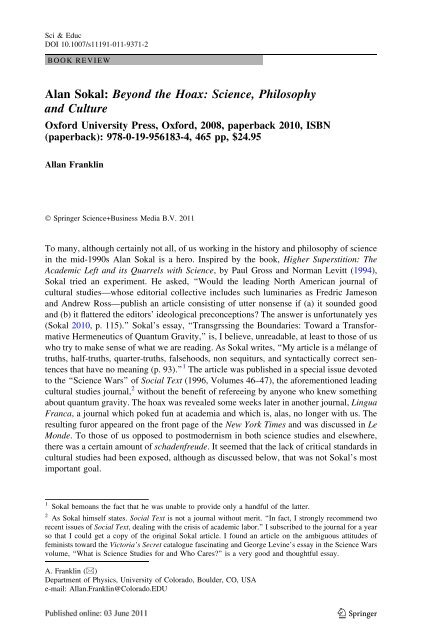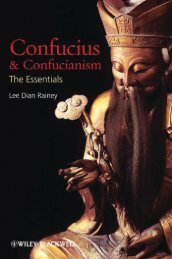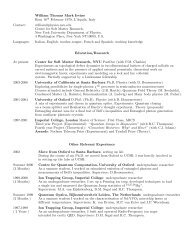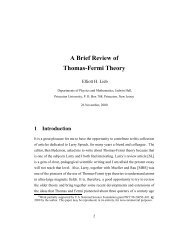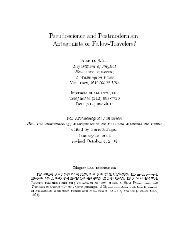Alan Sokal: Beyond the Hoax: Science ... - Department of Physics
Alan Sokal: Beyond the Hoax: Science ... - Department of Physics
Alan Sokal: Beyond the Hoax: Science ... - Department of Physics
Create successful ePaper yourself
Turn your PDF publications into a flip-book with our unique Google optimized e-Paper software.
Sci & Educ<br />
DOI 10.1007/s11191-011-9371-2<br />
BOOK REVIEW<br />
<strong>Alan</strong> <strong>Sokal</strong>: <strong>Beyond</strong> <strong>the</strong> <strong>Hoax</strong>: <strong>Science</strong>, Philosophy<br />
and Culture<br />
Oxford University Press, Oxford, 2008, paperback 2010, ISBN<br />
(paperback): 978-0-19-956183-4, 465 pp, $24.95<br />
Allan Franklin<br />
Ó Springer <strong>Science</strong>+Business Media B.V. 2011<br />
To many, although certainly not all, <strong>of</strong> us working in <strong>the</strong> history and philosophy <strong>of</strong> science<br />
in <strong>the</strong> mid-1990s <strong>Alan</strong> <strong>Sokal</strong> is a hero. Inspired by <strong>the</strong> book, Higher Superstition: The<br />
Academic Left and its Quarrels with <strong>Science</strong>, by Paul Gross and Norman Levitt (1994),<br />
<strong>Sokal</strong> tried an experiment. He asked, ‘‘Would <strong>the</strong> leading North American journal <strong>of</strong><br />
cultural studies—whose editorial collective includes such luminaries as Fredric Jameson<br />
and Andrew Ross—publish an article consisting <strong>of</strong> utter nonsense if (a) it sounded good<br />
and (b) it flattered <strong>the</strong> editors’ ideological preconceptions? The answer is unfortunately yes<br />
(<strong>Sokal</strong> 2010, p. 115).’’ <strong>Sokal</strong>’s essay, ‘‘Transgrssing <strong>the</strong> Boundaries: Toward a Transformative<br />
Hermeneutics <strong>of</strong> Quantum Gravity,’’ is, I believe, unreadable, at least to those <strong>of</strong> us<br />
who try to make sense <strong>of</strong> what we are reading. As <strong>Sokal</strong> writes, ‘‘My article is a mélange <strong>of</strong><br />
truths, half-truths, quarter-truths, falsehoods, non sequiturs, and syntactically correct sentences<br />
that have no meaning (p. 93).’’ 1 The article was published in a special issue devoted<br />
to <strong>the</strong> ‘‘<strong>Science</strong> Wars’’ <strong>of</strong> Social Text (1996, Volumes 46–47), <strong>the</strong> aforementioned leading<br />
cultural studies journal, 2 without <strong>the</strong> benefit <strong>of</strong> refereeing by anyone who knew something<br />
about quantum gravity. The hoax was revealed some weeks later in ano<strong>the</strong>r journal, Lingua<br />
Franca, a journal which poked fun at academia and which is, alas, no longer with us. The<br />
resulting furor appeared on <strong>the</strong> front page <strong>of</strong> <strong>the</strong> New York Times and was discussed in Le<br />
Monde. To those <strong>of</strong> us opposed to postmodernism in both science studies and elsewhere,<br />
<strong>the</strong>re was a certain amount <strong>of</strong> schadenfreude. It seemed that <strong>the</strong> lack <strong>of</strong> critical standards in<br />
cultural studies had been exposed, although as discussed below, that was not <strong>Sokal</strong>’s most<br />
important goal.<br />
1<br />
<strong>Sokal</strong> bemoans <strong>the</strong> fact that he was unable to provide only a handful <strong>of</strong> <strong>the</strong> latter.<br />
2<br />
As <strong>Sokal</strong> himself states. Social Text is not a journal without merit. ‘‘In fact, I strongly recommend two<br />
recent issues <strong>of</strong> Social Text, dealing with <strong>the</strong> crisis <strong>of</strong> academic labor.’’ I subscribed to <strong>the</strong> journal for a year<br />
so that I could get a copy <strong>of</strong> <strong>the</strong> original <strong>Sokal</strong> article. I found an article on <strong>the</strong> ambiguous attitudes <strong>of</strong><br />
feminists toward <strong>the</strong> Victoria’s Secret catalogue fascinating and George Levine’s essay in <strong>the</strong> <strong>Science</strong> Wars<br />
volume, ‘‘What is <strong>Science</strong> Studies for and Who Cares?’’ is a very good and thoughtful essay.<br />
A. Franklin (&)<br />
<strong>Department</strong> <strong>of</strong> <strong>Physics</strong>, University <strong>of</strong> Colorado, Boulder, CO, USA<br />
e-mail: Allan.Franklin@Colorado.EDU<br />
123
A. Franklin<br />
It is, <strong>the</strong>refore, with some sadness that I have to report that this collection, consisting<br />
almost entirely <strong>of</strong> previously published essays by <strong>Sokal</strong>, is somewhat disappointing. There<br />
are parts <strong>of</strong> <strong>the</strong> book that are <strong>of</strong> value, but overall, except for a few <strong>of</strong> <strong>the</strong> later essays, <strong>the</strong>re<br />
is a sense <strong>of</strong> déjà vu. 3 The first section <strong>of</strong> <strong>the</strong> book, ‘‘The Social Text Affair’’, begins with a<br />
ra<strong>the</strong>r long annotated version <strong>of</strong> ‘‘Transgressing <strong>the</strong> Boundaries,’’ which explains all <strong>of</strong> <strong>the</strong><br />
numerous jokes. My own reaction on rereading this version was to be reminded <strong>of</strong> <strong>the</strong> old<br />
admonition to comedians. When you explain a joke it loses much <strong>of</strong> its humor. The essay<br />
itself, in all <strong>of</strong> its incomprehensibility, is hilarious. It needs no fur<strong>the</strong>r explanation. The<br />
remainder <strong>of</strong> <strong>the</strong> first section deals with <strong>the</strong> aftermath <strong>of</strong> <strong>the</strong> hoax. In ‘Transgressing <strong>the</strong><br />
Boundaries: An Afterword’ <strong>Sokal</strong> explains <strong>the</strong> reasons for his hoax. He states that he was<br />
not defending science against ‘‘<strong>the</strong> barbarian hordes <strong>of</strong> lit crit or sociology,’’ because he<br />
doubts that such a defense is necessary. 4 Despite <strong>the</strong> resulting academic furor, <strong>Sokal</strong> states<br />
that his initial goal was not to show <strong>the</strong> absurdity <strong>of</strong> postmodern views <strong>of</strong> science or that<br />
<strong>the</strong> standards <strong>of</strong> rigor in postmodern scholarship were lacking, but ra<strong>the</strong>r as ‘‘an unabashed<br />
Old Leftist,’’ he wanted to restore <strong>the</strong> view that science and reason have always been a<br />
means <strong>of</strong> opposing social oppression and that adopting a postmodern view <strong>of</strong> science does<br />
not support that goal. ‘‘What I believe this debate is principally about… is <strong>the</strong> nature <strong>of</strong><br />
truth reason, and objectivity, and its implications for progressive political action.’’ This is<br />
indeed a <strong>the</strong>me that runs throughout <strong>the</strong> book.<br />
In ‘‘<strong>Science</strong> studies: Less than meets <strong>the</strong> eye,’’ <strong>Sokal</strong> examines <strong>the</strong> work <strong>of</strong> Carolyn<br />
Merchant, Sandra Harding, and Evelyn Fox Keller, three icons <strong>of</strong> feminist science studies.<br />
He notes that both Harding and Merchant bemoan allegedly sexist metaphors on experimentation,<br />
rape (Harding) and torture (Merchant), in <strong>the</strong> work <strong>of</strong> Francis Bacon. He notes<br />
that <strong>the</strong> work <strong>of</strong> Noretta Koertge, <strong>Alan</strong> Soble, and o<strong>the</strong>rs have argued persuasively that<br />
feminist critics <strong>of</strong> science have found sexual innuendos where none exist and have<br />
exaggerated that attribution <strong>of</strong> violence to experimentation (Koertge 1998). In particular,<br />
he quotes a famous, or possibly infamous, statement by Sandra Harding. ‘‘A consistent<br />
analysis would lead to <strong>the</strong> conclusion that understanding nature as a woman indifferent to<br />
or even welcoming rape was equally fundamental to <strong>the</strong> interpretations <strong>of</strong> nature and<br />
inquiry. Presumably <strong>the</strong>se metaphors, too, had fruitful pragmatic, methodological, and<br />
metaphysical consequences for science. In that case, why is it not as illuminating and<br />
honest to refer to Newton’s laws as ‘Newton’s rape manual’ as it is to call <strong>the</strong>m ‘Newton’s<br />
mechanics (Harding 1986, p. 113).’’’ He notes that Harding has seemingly said that rape<br />
and torture metaphors have had ‘‘fruitful pragmatic, methodological, and metaphysical<br />
consequences for science.’’ He asks, ‘‘Does Harding realize what she is saying (p. 121).’’<br />
Such a view is, in fact, disastrous for feminism. <strong>Sokal</strong> also discusses Fox Keller’s<br />
Reflections on Gender and <strong>Science</strong> (1985). He notes that Fox Keller’s discussion <strong>of</strong> <strong>the</strong><br />
foundations <strong>of</strong> quantum mechanics has some well-taken points, but that <strong>the</strong>se are not<br />
particularly new. He remarks that ‘‘If feminist (or psychoanalytic) thought has anything to<br />
contribute to <strong>the</strong> interpretation <strong>of</strong> quantum mechanics—or for that matter to any branch <strong>of</strong><br />
<strong>the</strong> philosophy <strong>of</strong> physics—we’re still waiting (p. 129).’’ He does apologize for his ‘‘swift<br />
and selective refutation in <strong>the</strong> space <strong>of</strong> a few pages <strong>of</strong> several entire books (p. 129),’’ but<br />
both he and I regard <strong>the</strong> criticism as fair. <strong>Sokal</strong> closes his essay with criticism <strong>of</strong> Higher<br />
Superstition (1994), <strong>the</strong> book that started it all. He criticizes Gross and Levitt for both<br />
selectivity and exaggeration. His point is well taken. The description <strong>of</strong> Helen Longino’s<br />
3<br />
In a brief review I will not comment on all <strong>the</strong> essays.<br />
4<br />
Never<strong>the</strong>less, <strong>Sokal</strong> and Jean Bricmont authored a subsequent book, Fashionable Nonsense (1998), that<br />
exposed <strong>the</strong> ra<strong>the</strong>r silly views on science <strong>of</strong> such scholars as Irigaray and Lacan.<br />
123
<strong>Beyond</strong> <strong>the</strong> <strong>Hoax</strong><br />
<strong>Science</strong> as Social Knowledge (1990), a book with which I have considerable disagreement,<br />
does not resemble <strong>the</strong> book I read.<br />
The first section is an interesting set <strong>of</strong> historical documents and a view <strong>of</strong> an important<br />
intellectual controversy written by an important participant. None <strong>of</strong> <strong>the</strong> essays in this<br />
section were published after 1998. What is lacking is any discussion on how <strong>Sokal</strong> views<br />
<strong>the</strong> hoax from <strong>the</strong> perspective <strong>of</strong> 15 years later. One would like to read his answers to<br />
questions like: Are <strong>the</strong> <strong>Science</strong> Wars over? What was <strong>the</strong>ir importance? Have <strong>the</strong>re been<br />
any changes for <strong>the</strong> better? In short, I would have liked to read an essay, ‘‘Looking Back at<br />
<strong>the</strong> <strong>Hoax</strong>.’’<br />
<strong>Sokal</strong> does include a few references to more recent work in his footnotes, but he doesn’t<br />
discuss it in any detail. My own view is that although <strong>the</strong> science wars are still ongoing,<br />
albeit more quietly, and with fewer very active participants, <strong>the</strong>re are some hopeful signs.<br />
Take, for example, The One Culture? (2001) edited by Harry Collins, a leading social<br />
constructivist sociologist and Jay Labinger, a chemist at Caltech. As Sam Schweber wrote,<br />
‘‘In The One Culture? historians and sociologists <strong>of</strong> science concisely clarify <strong>the</strong> intent and<br />
methodology <strong>of</strong> <strong>the</strong>ir approach, while scientists respectfully make clear what irks <strong>the</strong>m<br />
about ‘science studies.’ In <strong>the</strong> subsequent exchanges, all concerned pave <strong>the</strong> way for<br />
fur<strong>the</strong>r fruitful interactions and researches (from <strong>the</strong> book cover).’’<br />
The second section <strong>of</strong> <strong>the</strong> book, ‘<strong>Science</strong> and Philosophy,’ contains two essays,<br />
‘‘Cognitive relativism in <strong>the</strong> philosophy <strong>of</strong> science’’ and ‘‘Defense <strong>of</strong> a modest scientific<br />
realism.’’ I shall comment only on <strong>the</strong> former. In this essay <strong>Sokal</strong> argues against relativism,<br />
which he regards as ‘‘pernicious both intellectually and politically,’’ and certain views in<br />
<strong>the</strong> philosophy <strong>of</strong> science which he believes have supported it. He defines relativism as<br />
‘‘any philosophy that claims that <strong>the</strong> truth or falsity <strong>of</strong> a statement is relative to an<br />
individual or to a social group (p. 174).’’ Cognitive relativism, according to <strong>Sokal</strong>, deals<br />
with statements concerning facts and comes in three forms: (1) ontological, relativism<br />
about truth, (2) epistemological, which focuses on <strong>the</strong> degree <strong>of</strong> justification <strong>of</strong> those facts<br />
by evidence, and (3) methodological, which asserts that sociologists should ignore truth<br />
and evidence in discussing why certain groups hold such beliefs.<br />
<strong>Sokal</strong> brings forth <strong>the</strong> usual suspects, Thomas Kuhn and Paul Feyerabend, and one<br />
unusual suspect, Karl Popper. As <strong>Sokal</strong> admits, Popper can hardly be called a relativist, but<br />
<strong>Sokal</strong> argues that <strong>the</strong> criticisms <strong>of</strong> Popper’s views do give aid and comfort to <strong>the</strong> relativist<br />
position. As is well known, Popper’s view is that in order for a statement or <strong>the</strong>ory to be<br />
scientific it must be falsifiable. There must be some possible state <strong>of</strong> <strong>the</strong> world that could<br />
refute it. Thus, <strong>the</strong> statement, ‘‘It is raining or it is not raining,’’ is unscientific because it<br />
cannot be falsified. 5 If a <strong>the</strong>ory has been falsified <strong>the</strong>n, according to Popper, it must be<br />
ruthlessly rejected. Popper also argues that <strong>the</strong>re is an asymmetry between confirmation<br />
and falsification. No finite set <strong>of</strong> observations <strong>of</strong> white swans can prove <strong>the</strong> statement, ‘‘All<br />
swans are white,’’ whereas <strong>the</strong> observation <strong>of</strong> a single black swan can falsify it. In Popper’s<br />
view <strong>the</strong>ories can only be refuted, not confirmed. There is, for Popper, no possibility <strong>of</strong><br />
probabilistic inductive support. <strong>Sokal</strong> points out that Popper’s view is inconsistent with <strong>the</strong><br />
history <strong>of</strong> science. Theories that are seemingly refuted are not always immediately rejected<br />
and that confirmations do increase belief in <strong>the</strong>ories. Consider <strong>the</strong> problems that discrepancies<br />
in <strong>the</strong> orbit <strong>of</strong> Uranus posed for Newton’s <strong>the</strong>ory <strong>of</strong> gravitation and <strong>the</strong> subsequent<br />
discovery <strong>of</strong> Neptune. The discrepancies did not lead to <strong>the</strong> rejection <strong>of</strong> Newton’s<br />
<strong>the</strong>ory and <strong>the</strong> discovery <strong>of</strong> Neptune was regarded as an important confirmation <strong>of</strong> that<br />
<strong>the</strong>ory. <strong>Sokal</strong> notes that <strong>the</strong>re are o<strong>the</strong>r difficulties for Popper’s view. Falsification is not as<br />
5 Any tautology would be unscientific.<br />
123
A. Franklin<br />
simple as Popper believed. Consider <strong>the</strong> modus ponens. If a hypo<strong>the</strong>sis h entails evidence<br />
e <strong>the</strong>n not e entails not h. As Duhem and Quine, in slightly different ways, pointed out it is<br />
not h alone that entails e, but ra<strong>the</strong>r h and b, that entails e, where b is background<br />
knowledge. Thus, not e entails not h or not b, and one doesn’t know where to put <strong>the</strong> not.<br />
These difficulties, according to <strong>Sokal</strong>, support relativism.<br />
Kuhn and Feyerabend are more plausible as support for relativist views. In Kuhn’s<br />
<strong>the</strong>ory <strong>of</strong> scientific revolutions, in which one paradigm, or world view, is replaced by<br />
ano<strong>the</strong>r, <strong>the</strong> decision cannot be based on evidence alone. Kuhn likens such change to a<br />
religious conversion. This is because paradigms are incommensurable. The argument,<br />
briefly stated, is that <strong>the</strong>re is no neutral observation language, all observation terms are<br />
<strong>the</strong>ory-laden. Experiments described in <strong>the</strong> same terms are not <strong>the</strong> same when interpreted<br />
in two different paradigms because <strong>the</strong> terms have different meanings. If evidence cannot<br />
decide such a change in paradigm <strong>the</strong>n we are left with relativism. <strong>Sokal</strong> does remark that<br />
<strong>the</strong>re are two different interpretations <strong>of</strong> Kuhn’s work, a moderate one, which does not<br />
really support relativism, and a radical one, which does. Most <strong>of</strong> <strong>the</strong> critics <strong>of</strong> science have<br />
adopted <strong>the</strong> radical view, a position that Kuhn, himself, disavowed. Feyerabend’s views as<br />
support for relativism is easier. In Against Method (1975), he argues that <strong>the</strong>re is no<br />
universal scientific method that fits <strong>the</strong> history <strong>of</strong> science and that <strong>the</strong>refore ‘‘anything<br />
goes.’’ For Feyerabend science is no better than voodoo. <strong>Sokal</strong> correctly points out that <strong>the</strong><br />
fact that all scientific methodologies have limitations does not imply that anything goes.<br />
For example, I know <strong>of</strong> no accepted scientific methodology that would condone <strong>the</strong><br />
manipulation <strong>of</strong> data to support one’s preferred <strong>the</strong>ory.<br />
The remainder <strong>of</strong> <strong>the</strong> essay is devoted to trenchant criticism <strong>of</strong> <strong>the</strong> relativist views <strong>of</strong><br />
social-constructivist sociologists <strong>of</strong> scientific knowledge such as Barry Barnes, David<br />
Bloor, and Bruno Latour. Although <strong>Sokal</strong>’s criticism <strong>of</strong> <strong>the</strong>se views is sharp, he <strong>of</strong>fers little<br />
evidence that <strong>the</strong>y, or o<strong>the</strong>r postmodern views <strong>of</strong> science, have, in fact, been influenced by<br />
<strong>the</strong> philosophies <strong>of</strong> Kuhn and Feyerabend or by <strong>the</strong> criticisms <strong>of</strong> Popper. I believe such<br />
arguments can be made, but <strong>Sokal</strong> hasn’t made <strong>the</strong>m. The essay does, however, make<br />
useful, short presentations <strong>of</strong> <strong>the</strong> views <strong>of</strong> <strong>the</strong> authors mentioned above.<br />
In <strong>the</strong> last two essays, ‘‘Religion, politics and survival’’ and ‘‘Epilogue: Epistemology and<br />
ethics,’’ both <strong>of</strong> which are published here for <strong>the</strong> first time, <strong>Sokal</strong> deals with more significant<br />
social issues. There are questions concerning <strong>the</strong> religious influence in American politics. In<br />
<strong>the</strong> former essay, <strong>Sokal</strong> does this by critically analyzing two books, The End <strong>of</strong> Faith (2004),<br />
a best seller by Sam Harris, and <strong>the</strong> lesser known Spirit Matters (2000) by Michael Lerner.<br />
<strong>Sokal</strong> considers <strong>the</strong>m both important, though ‘‘deeply flawed.’’ The books are written from<br />
two very different perspectives. Harris is an a<strong>the</strong>ist and Lerner is a well-known rabbi. Harris<br />
is quite caustic. ‘‘Jesus Christ—who, as it turns out, was born <strong>of</strong> a virgin, cheated death, and<br />
rose bodily into <strong>the</strong> heavens—can now be eaten in <strong>the</strong> form <strong>of</strong> a cracker. A few Latin words<br />
spoken over your favorite Burgundy, and you can drink his blood as well. Is <strong>the</strong>re any doubt<br />
that a lone subscriber to <strong>the</strong>se beliefs would be considered mad (Harris 2004, p. 72)?’’ <strong>Sokal</strong><br />
agrees. ‘‘Many people will no doubt be <strong>of</strong>fended by Harris’ (and my) characterization <strong>of</strong><br />
Catholicism and o<strong>the</strong>r religions as ‘mad’ (<strong>Sokal</strong> 2010, p. 377).’’<br />
Lerner, on <strong>the</strong> o<strong>the</strong>r hand advocates a ra<strong>the</strong>r vague Emancipatory Spirituality (Lerner’s<br />
capitals). In <strong>Sokal</strong>’s view, Lerner has a dubious cosmology, but important psychological<br />
insights that <strong>Sokal</strong> believes <strong>the</strong> political left should not ignore. Lerner criticizes <strong>the</strong> left for<br />
its condescension toward working class conservatives and <strong>the</strong>ir desire for purpose, value,<br />
and meaning in <strong>the</strong>ir lives.<br />
This brings <strong>Sokal</strong> to his real goal and an important sticking point. His goal is a just and<br />
fair society. The sticking point is <strong>the</strong> possible reconciliation <strong>of</strong> <strong>Sokal</strong>’s view <strong>of</strong> religion,<br />
123
<strong>Beyond</strong> <strong>the</strong> <strong>Hoax</strong><br />
which he regards a ‘‘massive delusion,’’ having no evidential basis, with <strong>the</strong> ethical and<br />
moral values that religious believers espouse. He also believes that we can, in fact, argue<br />
that progressive social policies are moral and do not conflict with basic moral values. He<br />
believes that this can open a fruitful dialogue between <strong>the</strong> left and <strong>the</strong> right-leaning<br />
evangelicals in <strong>the</strong> United States. One may hope he is correct but, given recent events, that<br />
hope may be slim.<br />
In <strong>the</strong> final essay <strong>Sokal</strong> reiterates his view that public debate must be grounded in <strong>the</strong><br />
best evidence available. He believes that religion has been given a free ride in <strong>the</strong> sense<br />
that it has not been subjected to <strong>the</strong> kinds <strong>of</strong> epistemological criticisms that o<strong>the</strong>r views<br />
face. He argues that making decisions based on insufficient evidence is immoral. He<br />
supports this with a story told by William Clifford, a nineteenth-century ma<strong>the</strong>matician.<br />
Clifford told <strong>of</strong> a ship owner who, suspecting that his ship was not seaworthy and facing<br />
considerable expense to make it so, persuaded himself that because <strong>the</strong> ship had survived<br />
many previous voyages, it was safe. He sent it out and <strong>the</strong> ship sank and all aboard<br />
perished. Clifford asked how one should judge <strong>the</strong> ship owner. He argued that <strong>the</strong> owner<br />
was both responsible and immoral because he had based his decision on insufficient<br />
evidence. <strong>Sokal</strong> agrees and extends this to all decisions. He ends with a plea for ‘‘sincere<br />
inquiry and honest debate (p. 458),’’ but recognizes that it might not be possible at this<br />
time.<br />
As I stated earlier this book is somewhat disappointing, but it is one that I will keep on<br />
my shelf. Despite <strong>the</strong> lack <strong>of</strong> a retrospective view <strong>of</strong> <strong>the</strong> <strong>Science</strong> Wars it, along with A<br />
House Built on Sand (1998), <strong>of</strong>fers one side <strong>of</strong> those wars. For <strong>the</strong> o<strong>the</strong>r side, Volumes<br />
46–47 (1996) <strong>of</strong> Social Text is a good reference. In addition, I find <strong>Sokal</strong>’s arguments that<br />
we can maintain a good epistemology and still share <strong>the</strong> humane values that will lead to a<br />
just society both persuasive and hopeful. It is not clear that <strong>the</strong>y will persuade those with<br />
opposing views, but one can hope.<br />
References<br />
Collins, H., & Labinger, J. (Eds.). (2001). The one culture?. Chicago: University <strong>of</strong> Chicago Press.<br />
Feyerabend, P. (1975). Against method. Verso: London.<br />
Gross, P., & Levitt, N. (1994). Higher superstition: The academic left and its quarrles with science.<br />
Baltimore: Johns Hopkins University Press.<br />
Harding, S. (1986). The science question in feminism. Ithaca: Cornell University Press.<br />
Harris, S. (2004). The end <strong>of</strong> faith: Religion, terror, and <strong>the</strong> fiture <strong>of</strong> reason. New York: W.W. Norton.<br />
Keller, E. F. (1985). Reflections on gender and science. New Haven: Yale University Press.<br />
Koertge, N. (Ed.). (1998). A house built on sand: Exposing postmodernist myths about science. Oxford:<br />
Oxford University Press.<br />
Lerner, M. (2000). Sprit matters. Charlottesville, VA: Hampton Roads Publishing Co.<br />
Longino, H. (1990). <strong>Science</strong> as social knowledge. Princeton: Princeton University Press.<br />
<strong>Sokal</strong>, A. (2010). <strong>Beyond</strong> <strong>the</strong> <strong>Hoax</strong>: science, philosophy and culture. Oxford: Oxford University Press.<br />
<strong>Sokal</strong>, A., & Bricmont, J. (1998). Fashionable nonsense. New York: Picador Press.<br />
123


